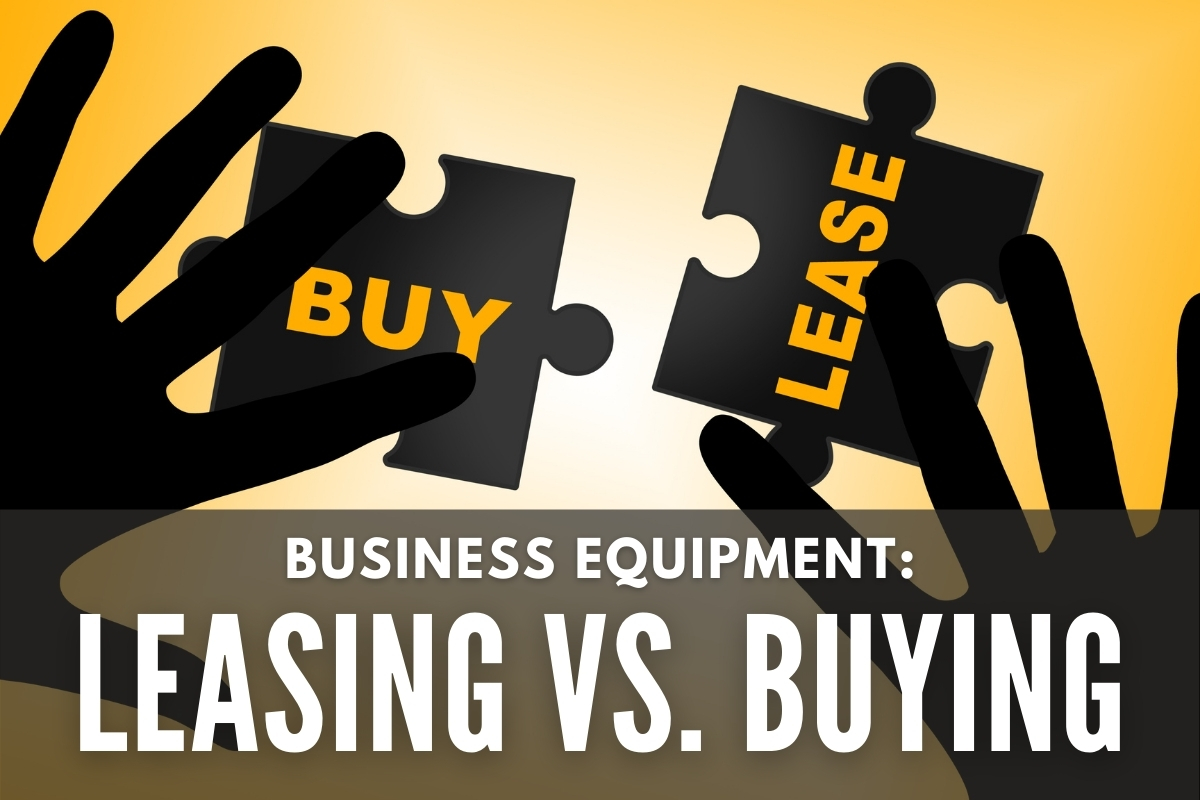

Every small business eventually needs new equipment. Whether you need the latest technology or machinery for manufacturing or packaging, you will want to consider the benefits of leasing vs. buying equipment before making a decision. Although both have some obvious advantages and disadvantages, you will most likely find that one is the clear winner for your business based on your overall cash flow and annual tax requirements. Check out some of the pros and cons of each as you make your decision.

Are you wondering how to stay innovative and keep your small business current? You may just find that leasing new equipment or machinery from a reputable leasing company will help you do just that, eliminating large upfront cash outlays so you can get the latest equipment to help your business grow.
1. Lower initial cost
If you do not have the money to buy equipment outright, leasing is a more affordable choice, especially for costly equipment.
2. Tax deduction
You should be able to deduct the entire monthly lease payment on your taxes.
3. Readily available equipment upgrades
Depending on your lease, you may be able to upgrade your equipment when needed, reducing the chance that you will be stuck with obsolete equipment.
4. Easier equipment maintenance
Many equipment finance plans cover the cost of maintenance for you, allowing you to enjoy modern equipment without high repair costs.
While leasing comes with many advantages, you will also need to consider the downsides of this choice if you hope to make a well-rounded decision.
1. Increased overall cost
When you consider how much you will be paying monthly over the length of the lease, you will find that your new equipment ultimately costs you more than buying it outright would.
2. Difficult lease terms
In some cases, unclear or harsh lease terms will leave you with obsolete equipment, little maintenance support, and no way to get out of the lease.
3. No equity
Because you do not own the equipment, you are not building equity in your business.

In some instances, buying equipment for your business may end up being the better solution, particularly if you have cash readily available. Here are a few benefits to this choice.
1. Tax benefits
According to Section 179 of the IRS’s tax code, you can deduct the full cost of your new equipment as an ordinary and necessary business expense. Although there are deduction limits, you should check with your accounting professional for guidance.
2. Depreciation deduction
You may additionally be able to claim tax deductions from equipment depreciation in future years.
3. Ability to modify or upgrade equipment when needed
Because you have complete control over your equipment, you can decide when you want to upgrade it, how you want to improve it, and when you want to sell it.
Much like leasing, buying equipment for your business also comes with several disadvantages, and you may find that these downsides are enough to make you choose lease payments over full-cost purchases.
1. Expensive
Depending on the equipment’s price or how much gear you need, you may find that you simply cannot afford to buy it outright.
2. Possible outdated equipment
Because of limited resources, you may not be able to afford to upgrade your purchased equipment. You will not have the advantage of automatic upgrades as you would with equipment leased from another company.
3. Increased expense with maintenance
You will also be responsible for all maintenance costs on the equipment you own.

Ultimately, only you will be able to make the final decision as to whether leasing or buying is right for your business. While you can now clearly see the benefits of leasing vs. buying equipment, you may determine that one or the other better meets your clients’ needs or customers along with your employees. Ask yourself some of the following questions to assess the pros and cons of each for your business.
-Which option can you afford?
-Which option offers the best tax benefits?
-How well does the equipment retain its value?
-What are the terms of the lease? (e.g., length, interest rate, prepayment penalties, lease buyout, etc.)
-What will the monthly payments be?
If you need more help in determining what would be best for your small business or are simply looking for innovative ways to grow your business, turn to E-Marketing Associates. Since 1999, we have helped small businesses make more sales and improve their online presence with software and services to help them compete and thrive.
Leasing typically demands little or no down payment, preserving cash flow, whereas purchasing requires the full price or significant deposit immediately, which can strain a small business budget.
Lease payments are usually fully deductible as operating expenses, delivering consistent write-offs each month. Purchased equipment may qualify for Section 179 and depreciation deductions, offering larger early-year tax relief but requiring ownership.
Pay close attention to interest rates, harsh termination clauses, maintenance responsibilities, upgrade options, and end-of-term buyout costs. Unfavorable terms can leave you overpaying, stuck with outdated gear, or liable for repairs.
Purchasing is often better if you have sufficient cash, intend to use the machinery long term, expect it to retain value, want freedom to modify it, and prefer building equity instead of ongoing payments.
If technology becomes obsolete quickly, leasing allows frequent upgrades without disposing of old assets. When equipment has a long productive life and minimal innovation cycles, buying can provide lower total cost and ownership control.